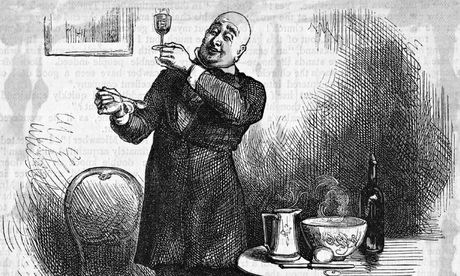
George Osborne’s determination to pursue a budget surplus immediately called to mind Mr Micawber, a character in Charles Dickens’s David Copperfield. He is invoked for his avowed belief that the surplus of income over expenditure is the source of all human felicity. This is no surprise: when Dickens invented a character he aimed for singularity, but also a pattern that his readers would recognise. We do so still. We hear Micawber in the pronouncement of a politician, Gradgrind in the utilitarianism of some educationalists, Uriah Heep in the fake humility of an underling who hates us, really. The best Dickens characters are types who are still with us.
Pecksniff
Mr Pecksniff in Martin Chuzzlewit is “a moral man: a grave man, a man of noble sentiments”. Spouting pieties as he ruthlessly pursues his interests, he is a role model for any modern hypocrite. Accused by Chuzzlewit of deep-dyed villainy, he piously rises to the occasion. “I weep for your depravity, sir, I mourn over your corruption, I pity your voluntary withdrawal of yourself from the flowery paths of purity and peace.” Sepp Blatter announcing his gratitude to those who were investigating financial irregularities at Fifa was pure Pecksniffery.
Jaggers
Dickens gave us many a type of frightening lawyer – see the vampire Vholes and the all-knowing Tulkinghorn in the lawyer-filled Bleak House. The purest type of lawyerly authority is Mr Jaggers in Great Expectations, a man who knows that in any free-ish society, the lawyer has the greatest power – true as much today as it was then. His every action exerts power: having lunch “he seemed to bully his sandwich as he ate”. He smells of soap and never says a careless word, but he governs destinies.
Mrs Gamp
The gin-soaked nurse and layer-out of the dead in Martin Chuzzlewit, Mrs Gamp, is the trusty attendant who should never be trusted. It is her mangling of the English language that makes her immortal, her gift for pummelling a cliche into poetry living on in the ruminations of John Prescott and many a football manager. Offered payment for watching a corpse by the undertaker Mr Mould, she confesses that cash comes in handy as she is “but a poor woman”. “Rich folks may ride on camels, but it an’t so easy for ’em to see out of a needle’s eye. That is my comfort, and I hope I knows it.”
Steerforth
If you are going to do bad things to people – betray their loyalties, take their money, seduce their daughters – then best to act like a toff, languorously, and as if it were a privilege to be ill-treated by you. The hero of David Copperfield is besotted with his former schoolfriend James Steerforth (naturally the only boy in the school who was never beaten by the appalling headmaster Mr Creakle). On their first meeting he yawningly asks callow David, “You haven’t got a sister, have you?” Everyone falls for him (bad luck Little Em’ly!) and you would fall for him, too. Not difficult to think of latter-day incarnations.
Mr Dorrit
The heroine’s father in Little Dorrit presides self-importantly as the honoured patriarch of the debtors’ prison. What has got him here? He would say mischance and an overweening bureaucracy, but of course it is also his own doing. The debtor’s self-delusion and vanity exculpate him in his own eyes. Naturally, when he falls on unearned good times (an unexpected inheritance) he spends and spends with the arrogance of a man favoured by providence. He is perhaps not so much Yanis Varoufakis as the typical citizen of every advanced nation.
The Veneerings
Did Dickens invent the Hello! magazine photoshoot? In Our Mutual Friend he introduced us to Mr and Mrs Veneering, and surely foresaw the kind of moneyed couple who would nowadays invite the public into their dazzlingly vulgar interior life. “All their furniture was new, all their friends were new, all their servants were new, their plate was new, their carriage was new, their harness was new, their horses were new, their pictures were new, they themselves were new, they were as newly married as was lawfully compatible with their having a bran-new baby.” Look at our money!
Quilp
Daniel Quilp in The Old Curiosity Shop is a self-made man and all-round predator whose energy keeps making you forget his malice. He collects rents, lends money at interest, smuggles stuff – and he burns with malign invention. This “small lord of the creation” smokes cigars all night, drinks hot alcohol and mocks the timid conventionality of all around him. The young Rupert Murdoch? We may officially hate him, but he has that terrible life-force.
Dickens wrote his characters as warnings, and this makes them live again, too. Micawber may be a good mascot for budgetary prudence. We might, however, take note of the OED definition of “Micawber”: “Applied gen. to a feckless optimist with a habit of ‘waiting for something to turn up’.” Familiar?

